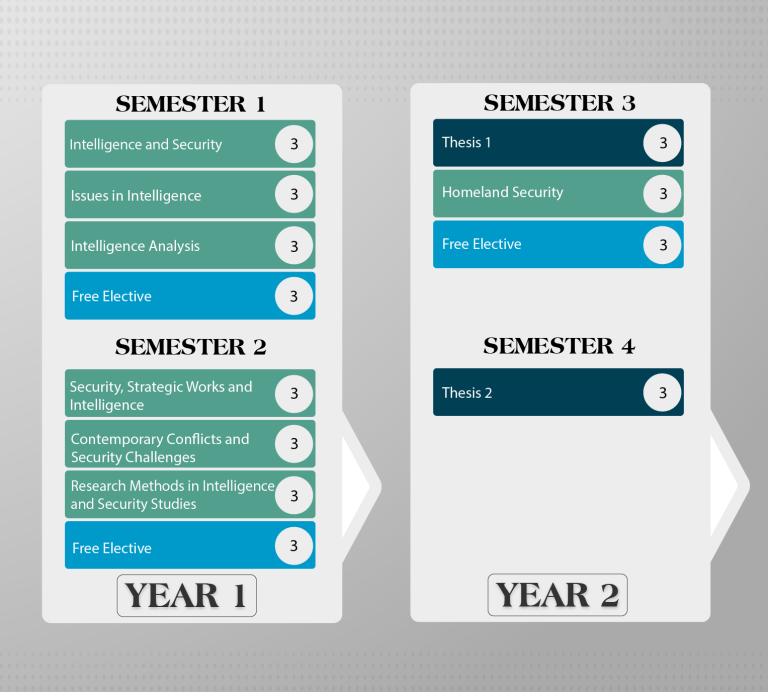Master in Security Studies and Information Analysis
The graduate program is an interdisciplinary, but specialized program, reaching out to practice, over theory. It analyzes and addresses current and emerging security and Intelligence challenges and opportunities.
The program prepares students, for a professional orientation in the Intelligence specialization and even more so in information analysis framework.
The program’s curriculum standards comply with the National Qualifications Framework of the UAE Level 9, Commission for Academic Accreditation (CAA) international accreditation standards, and International Association for Intelligence Education (IAFIE) education standards. The program is accredited by the UAE Ministry of Higher Education and Scientific Research.
Prospective students are provided with specialized knowledge spectrum in elements of Intelligence and information analysis regionally and globally. Students are keen in joining a framework of education that goes hand in hand with the security resilience policy of the UAE vision 2030, to meet the national and international educational standards; to offer knowledge capacity building and continuity through the world of security and global affairs.
The Master program, is designed for early and mid-career professionals; academically qualified graduates with B.A. or other higher degrees in the following fields but not limited to : International Relations, Political Science, International Studies, Security and Strategic Studies, Law, Humanities, Crisis Management, Criminology or a closely related or inter-related fields such as Communication, and Business, with specialization to security, strategy and international affairs, among others.
To apply for the Master’s program, students should meet all requirements of admission. All degrees should be in compliance with the Ministry of Higher Education and Scientific Research, graduates applying should reflect recognized and accredited Universities by the UAE. International Degrees, should be attested first before applying.
- Define and demonstrate the theory, history and contribution of the discipline of intelligence and security.
- Appraise collected data/information using a variety of analytic techniques and methodologies to produce original and advanced research in the Security and Intelligence field.
- Contextualize the principles of Security and Intelligence to evaluate intelligence and security threats.
- Apply critical thinking and innovative problem-solving skills for analyzing and reporting Security and Intelligence issues.
- Acquire the necessary skills to manage intelligence structures, functions, processes and practices in the UAE and GCC context.
ADMISSION REQUIREMENTS
GRADUATION REQUIREMENTS
For graduate degree completion, graduate students must satisfy the following requirements:
- Earn a minimum CGPA of 3.00 on a scale of 4.00.
- Successfully complete all courses as described in the study plan.
- The Degree Completion requirements must be met within the timeframe of the program.
- Successfully complete the “Thesis” course.
ACCREDITATION
PROGRAM STRUCTURE
Course Category
Total Number of Courses
Total Number of Credit Hours
Core Courses
7
21
Free Elective Courses
3
9
Thesis 1
1
3
Thesis 2
1
3
Total
36 Credit Hours
PROGRAM courses
CORE COURSES
7 COURSES | 21 CREDIT HOURS
This course examines the history, principles, concepts, functions and methods used in collecting intelligence information. The main emphasis in this course is placed on the collection, analysis, interpretation and the use of intelligence.
This course also recognizes and explores the evolving intersection between intelligence and national as well as global security.
This course also recognizes and explores the evolving intersection between intelligence and national security.
ELECTIVE COURSES
3 ELECTIVE COURSES | 9 CREDIT HOURS
This course focuses on offensive and defensive counterintelligence techniques, advanced agent handling, surveillance, and security investigations, all aimed at countering state-level actors. The course draws particular focus to regional and international law, ethical standards, security and policy. During this course, students will develop a comprehensive knowledge of CI. Students will study and analyze counterintelligence, focusing on CI operations and foreign intelligence services, including the development of CI, perspectives on counterintelligence throughout history, and assessments of successes and failures of CI. Students will learn and discuss multi-discipline CI support to intelligence operations, to denial and deception operations, and to covert operations.
THESIS
6 CREDIT HOURS
Students in this course will work with their thesis supervisor to develop a thesis proposal and begin their distinctive, applied research project. It is meant to stimulate students in acquiring and in-depth knowledge and insight in a specific subject of interest to the students which should contribute to the discipline areas of security and strategic studies. The primary goal is for the student to practice the mechanisms of transitioning from concept to active inquiry. Depending on the nature of the subject, the student will develop a study questions, conduct a literature review, develop a methodological approach, and begin preliminary research. Students are expected to apply qualitative, quantitative, and comparative research approaches to the chosen subject.
In this course, students will continue developing their thesis project, revising techniques (if required), addressing challenges, analysing findings, and eventually articulating the complete experience. Students will build on work from the previous semester and put all of the pieces together to complete the final thesis project, following the required research process and procedures. Students will be required to provide a verbal defense as part of the assessment and fulfilment of the course.
PROGRAM DIRECTOR

Prof. Eldar Šaljić
Dean / Professor / Acting Program Director of the Master in Security Studies and Information Analysis
THESIS TRACK
The Master in Security Studies and Information Analysis, includes a specialized based research Thesis.
THESIS SPECIALIZATION
Among others:
- Intelligence Analysis
- Informational Analysis Security
- Operations & Warfare
- Preventive and Pre-Emptive Operations
- Crisis Management & Operations
- Statecraft
- Information Analysis based on Open Sources
- Cyber-Security & War
- Application of Sustainable Development in the level of security and information analysis
- Future Security Challenges
- Policing and Counter-Extremism
- Future of Homeland Security
- Intelligence Infrastructure



